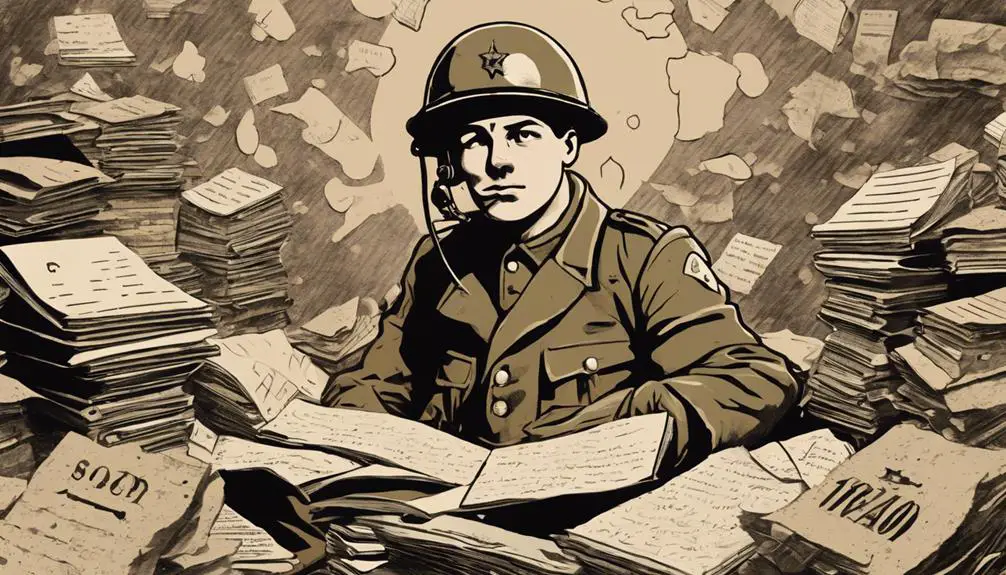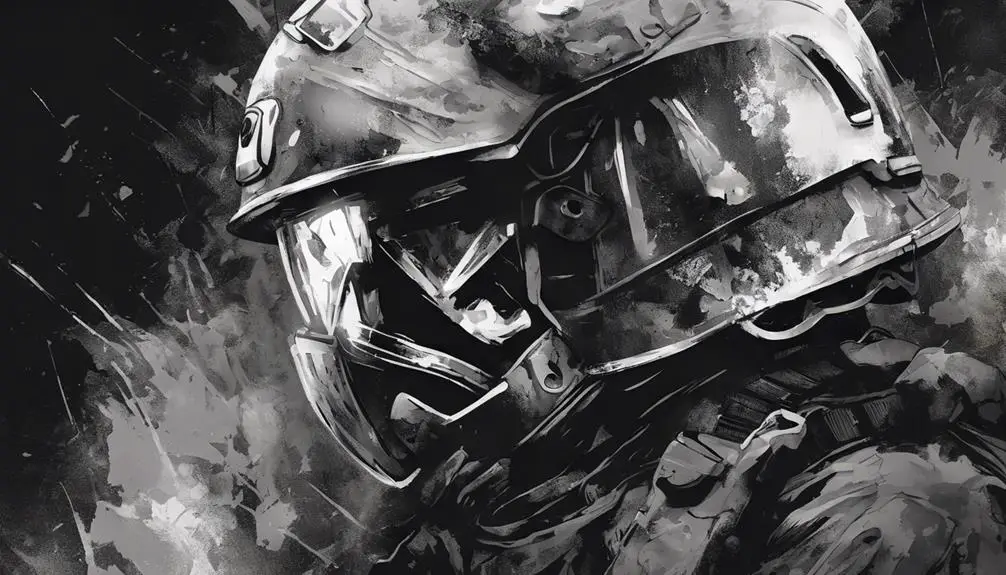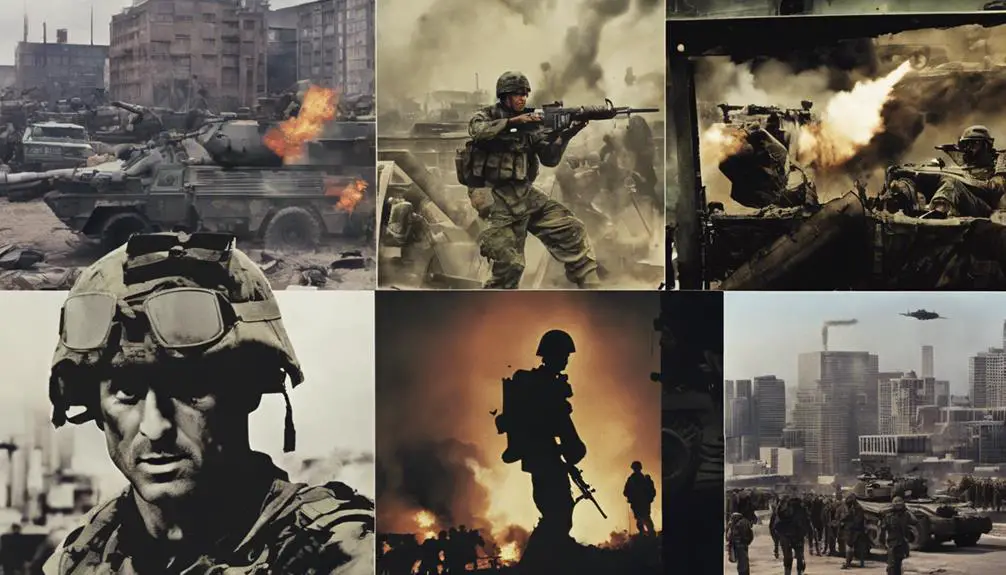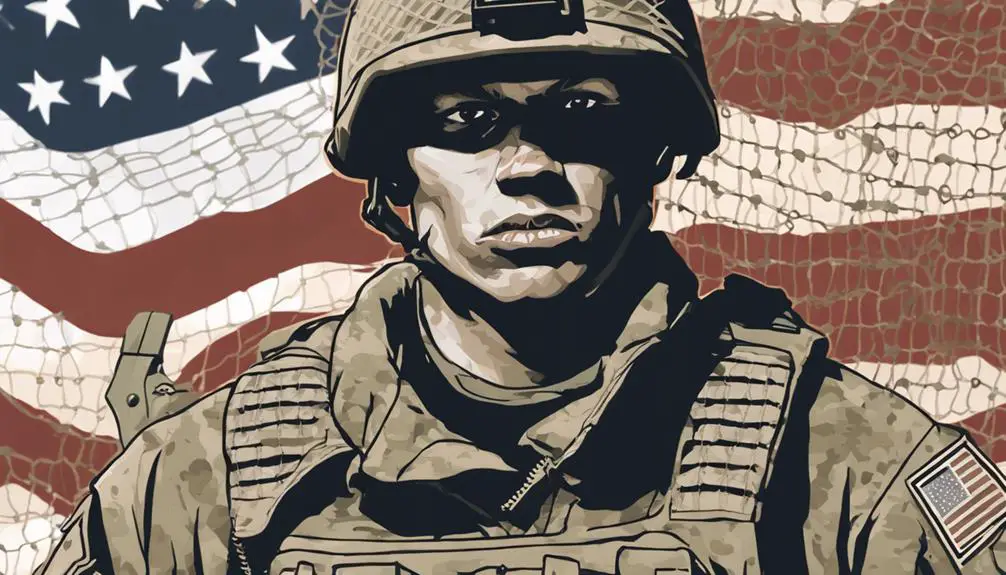Explore the rich history and nuances of this unique lexicon to uncover the origins of 'grunt' slang. Born in the trenches of WWI and WWII, this language emerged from the physical exertion sounds of exhausted, hungry, and dirty soldiers, becoming a badge of honor for infantrymen that has been passed down through generations. Today, you'll come across terms like 'beans' for MREs, 'brass' for artillery shells, and 'freaked' for fear. However, 'grunt' slang goes beyond just cool phrases – it offers a glimpse into soldiers' unfiltered emotions, dark humor, and cultural significance. Immerse yourself in this fascinating world to truly understand the essence of 'grunt' language.
Origins of Grunt Lingo

As you explore the world of Grunt military slang, you'll discover that its origins are deeply rooted in the early 20th century, when American soldiers first adopted the term 'grunt' to describe themselves. This etymological root can be traced back to the sound soldiers made while exerting themselves physically, like during combat training or while carrying heavy packs. The term stuck, and soon 'grunt' became a badge of honor, symbolizing the tough, no-nonsense attitude of the infantry.
In the historical context of World War I and II, Grunt lingo emerged as a way for soldiers to communicate quickly and efficiently on the battlefield. It was a language born out of necessity, where every second counted.
The military legacy of Grunt slang is evident in its widespread use across different branches of the US military. It's a cultural heritage that's been passed down through generations of soldiers, with each new generation adding its own flavor to the language.
Today, Grunt slang is an integral part of military culture, reflecting the values of camaraderie, loyalty, and sacrifice that define the military community.
Slang for Equipment and Ops
Your tactical gear is an essential extension of yourself in the field, and Grunt slang has a vocabulary that's just as rugged – from 'beans' for MREs (Meals Ready to Eat) to 'brass' for artillery shells. You've got to know your gear inside and out, and Grunt slang helps you do just that.
When it comes to operations, Grunt slang is all about efficiency and precision. You'll hear terms like:
'Gear checks**' for equipment inspections
'OpSec protocols**' for operational security procedures
- 'RTO' for radio telephone operators
- 'SITREP' for situation reports
These terms aren't just for show – they're essential for clear communication in high-stress situations.
Whether you're conducting a patrol or calling in airstrikes, Grunt slang helps you get the job done quickly and accurately. By mastering this vocabulary, you'll be able to work seamlessly with your team and stay focused on the mission at hand.
With Grunt slang, you can trust that your gear and ops will be running smoothly, so you can focus on getting the job done.
Emotions and Experiences Unfiltered

You've got to be able to process the raw emotions that come with serving in the trenches, and Grunt slang doesn't shy away from acknowledging the harsh realities of war. It's a language that's unapologetic, raw, and honest – a reflection of the emotional toll that comes with serving on the front lines.
| Emotion | Grunt Slang | Description |
|---|---|---|
| Fear | Freaked | Overwhelmed or intimidated by a situation |
| Guilt | Warrior's guilt | Feeling responsible for the death or injury of comrades |
| Exhaustion | Battle fatigue | Physical and mental exhaustion from prolonged combat |
| Anger | Fired up | Enraged or motivated to take action |
| Numbness | Emotionally spent | Feeling drained or disconnected from emotions |
Grunt slang provides a way to express the complex emotions that come with serving in combat. It's a way to process the trauma, the fear, and the guilt that can haunt soldiers long after they've left the battlefield. By acknowledging these emotions, Grunt slang offers a way to begin the healing process, to start talking about the things that are often left unspoken.
Humor in the Foxhole
In the midst of chaos, Grunt slang injects humor into the trenches, helping soldiers cope with the absurdity of war. You're surrounded by the sounds of gunfire and explosions, but amidst the chaos, a joke or prank can be a crucial tool for survival.
Humor becomes an essential instrument for endurance, a way to momentarily forget the dangers that lurk around every corner.
In the foxhole, humor takes many forms:
- Battle Jokes: Soldiers often crack jokes about the absurdity of their situation, making light of the heavy artillery and heavy casualties.
- Foxhole Pranks: A well-timed prank can be a morale booster, providing a much-needed distraction from the horrors of war.
- Squad Nicknames: Giving each other silly nicknames becomes a way to poke fun at each other and create a sense of camaraderie.
- Warped Wit: Soldiers develop a dark sense of humor, often making jokes about the grim realities of war.
In the foxhole, humor is a coping mechanism, a way to find levity in the darkest of times. It's a reminder that even in the midst of chaos, humanity can find a way to persevere.
Grunt Slang in Pop Culture

From movies to music, Grunt slang has permeated popular culture, with films like 'Apocalypse Now' and 'Platoon' showcasing the gritty, raw language of the trenches. You've likely heard iconic movie quotes like 'Hoo-ah!' from 'Black Hawk Down' or 'Osama, Osama, Osama' from 'The Hurt Locker'. These films have contributed to the widespread use of Grunt slang in everyday conversation.
In music, artists like Eminem and Kanye West have incorporated Grunt slang into their lyrics. You might recall Eminem's 'Just Lose It' where he raps, 'I'm a grunt, I'm a soldier, I'm a Marine.' Similarly, Kanye West's 'Black Skinhead' features the lyrics, 'Grunt, grunt, grunt, grunt, grunt.' These nods to Grunt slang have helped to further embed the language in popular culture.
As you engage with media, you're likely to come across Grunt slang more often than you think. By recognizing its presence, you'll gain a deeper understanding of the cultural significance of Grunt slang and its lasting impact on our collective language.
Lost in Translation: Civilian Misconceptions
As civilians adopt Grunt slang, they often misconstrue its original context, leading to a disconnect between the language's military roots and its modern, watered-down usage. You might think you're 'talking the talk,' but chances are, you're perpetuating stereotypes and misconception myths.
Here are a few ways civilians get it wrong:
- Misusing terms: Using phrases like 'Hooah' or 'Oorah' without understanding their origins or nuances.
- Civilian stereotypes: Assuming all military personnel are aggressive, macho, or uneducated – far from the truth.
- Glorifying war: Reducing complex, traumatic experiences to catchy phrases or hashtags.
- Omitting context: Failing to recognize the historical, cultural, and social contexts in which Grunt slang emerged.
Frequently Asked Questions
Are All Military Branches Using the Same Grunt Slang Terms?
You're wondering if all military branches use the same slang terms. The answer is, not quite. While some terms, like 'grunt,' have historic slang origins and have been adopted across branches, others are unique to specific services.
Slang in popular culture, like in movies and TV shows, often blurs the lines between branches. But, in reality, each branch has its own distinct lingo, shaped by their unique culture and experiences.
How Does Grunt Slang Change Across Different Generations?
Imagine you're a time traveler, witnessing the ever-changing linguistic landscape of military slang. As you navigate through generations, you'll notice that grunt slang evolves like a living organism, adapting to its environment.
According to the Evolution Theory, language mutates to fit the Era Signatures of its time. You'll find that each generation leaves its unique mark, like a fossil in the linguistic strata, reflecting the cultural, social, and historical context in which it emerged.
Can Civilians Use Grunt Slang Without Being Offensive?
Authenticity is crucial when considering using slang from a culture that isn't your own. Understanding whether civilians can incorporate grunt slang without causing offense is a wise approach.
Authenticity matters – utilizing terms without a grasp of their context or history can be perceived as disrespectful. It's important to earn the privilege to use certain language and be cautious of cultural appropriation.
If you aren't part of the military community, it's advisable to refrain from using grunt slang to avoid being viewed as a poser or, even worse, causing offense.
Are There Regional Differences in Grunt Slang Usage?
You're exploring a linguistic map, where dialects and accents vary like twists and turns on a winding road.
When it comes to regional differences in slang usage, you'll find Geographic Variations that reflect local flavor and Cultural Influences.
Just as a Southern drawl differs from a New Yorker's clip, regional slang takes on distinct characteristics shaped by local traditions and history.
Is Grunt Slang Used More in Combat Zones or in Garrison?
When you're in the military, you might wonder if certain lingo is used more in combat zones or back at the base. You'll find that the deployment atmosphere is intense, with a focus on survival and teamwork.
In contrast, the garrison culture is more relaxed, with a focus on training and routine. Given these differences, it's likely that slang usage would vary between these two environments, with combat zones fostering a unique dialect born from shared experience and urgency.
Conclusion
As you close this chapter on grunt military slang, remember that words can be weapons, too. Like a well-aimed grenade, they can illuminate the darkness, or like a stray bullet, they can wound.
In the trenches of war, language is a shield, a sword, and a lifeline. So, the next time you hear a grunt's lingo, don't be a civvie – listen closely, and you might just hear the echoes of a thousand midnights, like the whispers of the battlefield's ghosts.







